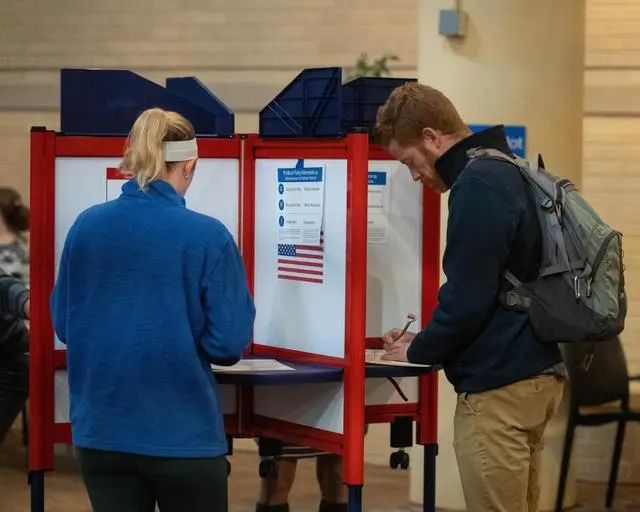【双语】这些关于选举的英文单词,你都认识吗?
美国2022年中期选举于当地时间11月8日举行。根据美国宪法,美国总统选举每四年举行一次,国会选举每两年举行一次。其中一次国会选举与四年一度的总统选举同时举行,而另一次则在总统任期之间举行。在总统任期之间举行的国会选举,就是“中期选举”,英文翻译为mid-term election。要想看懂美国的政治选举,你还需要了解这些词汇。
 11月8日,选民在美国弗吉尼亚州阿灵顿的一处投票点参加中期选举投票
11月8日,选民在美国弗吉尼亚州阿灵顿的一处投票点参加中期选举投票
(新华社)
▌Electoral College
选举人团
The United States Electoral College is a group of electors, chosen by the voters to formally elect the president.美国选举人团是一群由选民选出的选举人,美国总统由选举人团选举产生。
There are 538 electors, based on the number of representatives in the House of Representatives (435) and the 100 senators in the Senate.选举人团共有538名选举人,数量根据参众两院议员数量而定(众议员435名议员,参议员100名议员)。
▌Bicameral
两院制
Derived from the Latin bi meaning “two” and camer meaning “chamber,” a bicameral system of government is a legislative body with two chambers.Bi源自拉丁文表示“两个”,camer的意思为“议院”,两院制政治制度指由两个议院组成的立法机构。
In the case of the United States, this refers to the Senate and the House of Representatives.就美国而言,两院就是指参议院和众议院。
▌Apportionment
议席分配
Derived from the Middle French apportionner meaning “to portion,” apportionment is the proportional distribution of seats in a legislative body on the basis of population.Apportionment源自中古法语词汇apportionner,意思是“按比例分配”。Apportionment是指在立法机构中根据人口比例分配席位。
In the United States legislature, the composition of the House of Representatives is determined in this manner. Election officials get this number by comparing the population of each state to the total population of the country. Based on that proportion, they decide how many of the 435 seats in the House a given state is entitled to.在美国立法机构中,众议院的组成是这样确定的。选举官员计算各州人口占全国总人口的比例,根据这一比例,决定一个州在众议院435个席位中占有多少席位。
▌Nineteenth Amendment
《美国宪法第十九修正案》
Ratified on August 18, 1920, the Nineteenth Amendment to the United States Constitution granted women the right to vote.1920年8月18日批准的《美国宪法第十九修正案》赋予女性选举权。
Suffragettes Susan B. Anthony and Elizabeth Cady Stanton drafted the amendment in 1878, though it was not ratified for 42 years.妇女参政论者苏珊·B·安东尼和伊丽莎白·卡迪·斯坦顿于1878年起草了这项修正案,但该修正案在42年后才被批准。
▌precinct
选区
Also referred to as a voting district, a precinct is one of a fixed number of districts, each containing one polling place, into which a city, town, etc., is divided for voting purposes.选区也称投票区,为进行投票,城市、城镇划分固定数量的选区,每个选区包含一个投票站。
▌Plurality
相对多数;票数差额
Known in British English as relative majority, plurality can occur when there are three or more candidates running for a single office.Plurality在英式英语中表示相对多数,当有三个或三个以上的候选人竞选一个职位时,就可能出现相对多数票。
The term refers to the excess amount of votes received by the leading candidate, when they collect the most votes (plurality) but not necessarily more than half the votes (absolute majority). The United States employs a simple-plurality voting system.该术语是指领先候选人获得最多选票(相对多数票),但不一定超过半数选票(绝对多数票)时胜出的差额。美国选举采取简单多数票制。
▌electorate
全体选民
The electorate is the body of persons entitled to vote in an election. The root is derived from the Latin elector meaning “chooser,” though the term did not come into common use until the 1870s.这个词指有权在选举中投票的人群。这个词根来源于拉丁语elector,意思是“选择者”,直到19世纪70年代这个词才被广泛使用。
▌constituents选民
A constituent is someone who lives in a particular constituency, especially someone who is able to vote in an election.选民是居住在特定选区的人,尤其指能够在选举中投票的人。
The term stems from the Latin constituere meaning “that which makes up or composes.” It was first used as a noun in 1714 when it came to mean “one who appoints or elects a representative.”这个词源于拉丁语constituere,意思是“组成的东西”。1714年,constituent首次被用作名词,意指“任命或选举代表的人”。